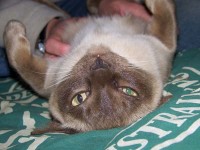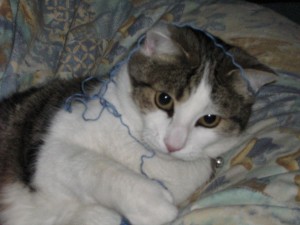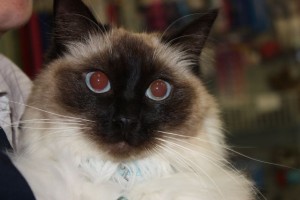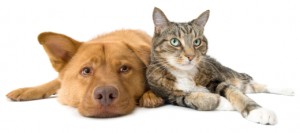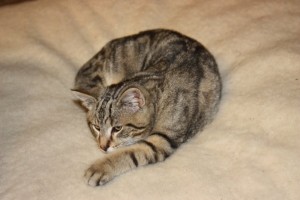 Feline leukaemia virus (FeLV) is an important viral infection of young cats in multi-cat households. Over the last few years infection has become less common.
Feline leukaemia virus (FeLV) is an important viral infection of young cats in multi-cat households. Over the last few years infection has become less common.
What diseases are associated with FeLV?
FeLV infection suppresses the immune system making the cat susceptible to secondary infections and chronic diseases that would not affect a normal healthy cat. These include mouth ulceration, cat flu, and fungal infections.
Cancers of the white blood cells and solid tumours such as lymphoma cause 10-25% of FeLV deaths.
Anaemia and other blood cell abnormalities are very common in FeLV infected cats. Other FeLV-related diseases include abortion, fading kittens, diarrhoea, neurological or nervous system signs, and immune-mediated disease.
Around 80-90% of persistently FeLV-infected cats will die within 3.5 years of diagnosis.
How is the virus transmitted?
The virus is transmitted by direct contact between cats during grooming or sharing of litter trays and food bowls over a long period of time.
The virus is fragile and does not survive for long in the environment.
An infected queen passes the virus on to all her kittens if she carries them to term. However, this is uncommon as infection with FeLV usually causes infertility or abortion.
What happens when a cat is exposed to FeLV?
Not all cats exposed to FeLV go on to develop FeLV-related diseases. Most cats eliminate the virus from the body, although some remain latently infected for a few months before they conquer the virus completely.
In cat colonies where the virus is endemic only 30% of cats are persistently infected with FeLV and go on to develop FeLV-related disease. These cats are responsible for the transmission of FeLV to other cats.
How do we diagnose FeLV?
A test at the surgery detects FeLV virus in the blood of a persistently infected cat.
A negative result is always negative. Your vet will assess the predictive value of a positive result by taking your cat’s environment, housemates and outside access into account.
Cats in the process of eliminating the virus will test positive. A second test performed 8-12 weeks after the first test confirms persistent infection.
Is there any treatment for FeLV infection?
There is no treatment that eliminates the virus from the body.
Infected cats should be desexed and confined indoors to prevent exposure to infectious agents and other cats.
Because FeLV-infected cats are more susceptible to disease, vaccination for the common viruses that cause cat flu and enteritis is very important.
We treat secondary infections and other problems like mouth ulcers as they arise.
Most FeLV-infected cats eventually die of their infection or we elect to euthanase them if they are suffering.
Can we prevent infection?
If possible do not house your cat with a known infected cat. Any new cat to the household should test negative for FeLV.
If all the cats in the house are FeLV negative, confinement indoors will prevent casual exposure to wandering cats with the virus.
Breeders may prevent FeLV infection by blood testing all cats and isolating infected individuals.
Vaccination of cats in contact with other infected or potentially infected cats is advisable. As with other vaccines, an initial course of two injections is required, and annual boosters are necessary to maintain immunity.

